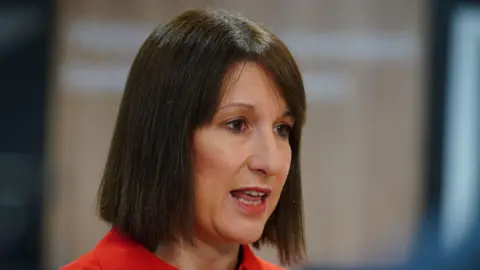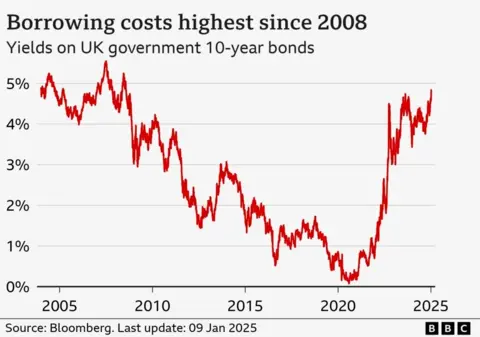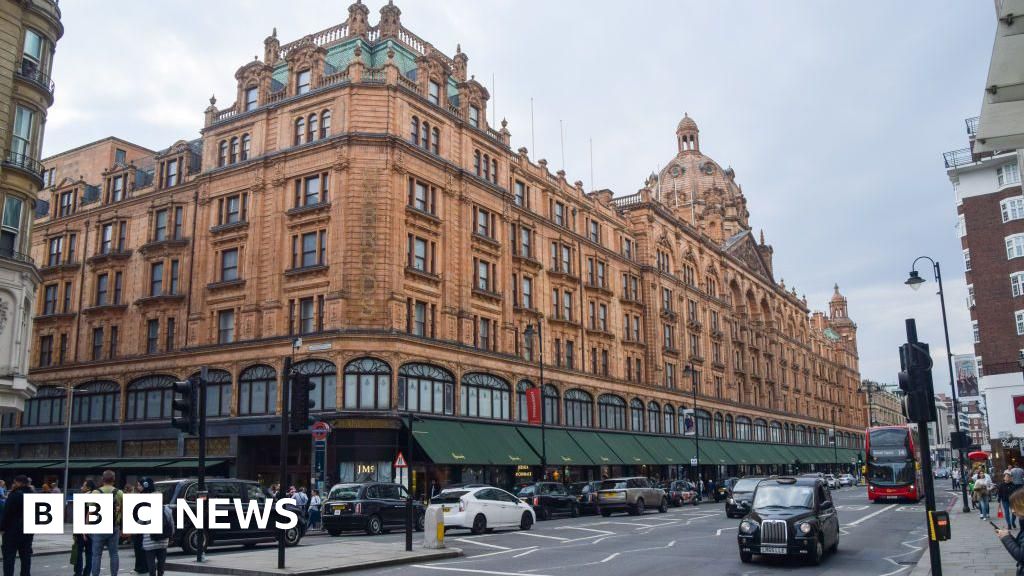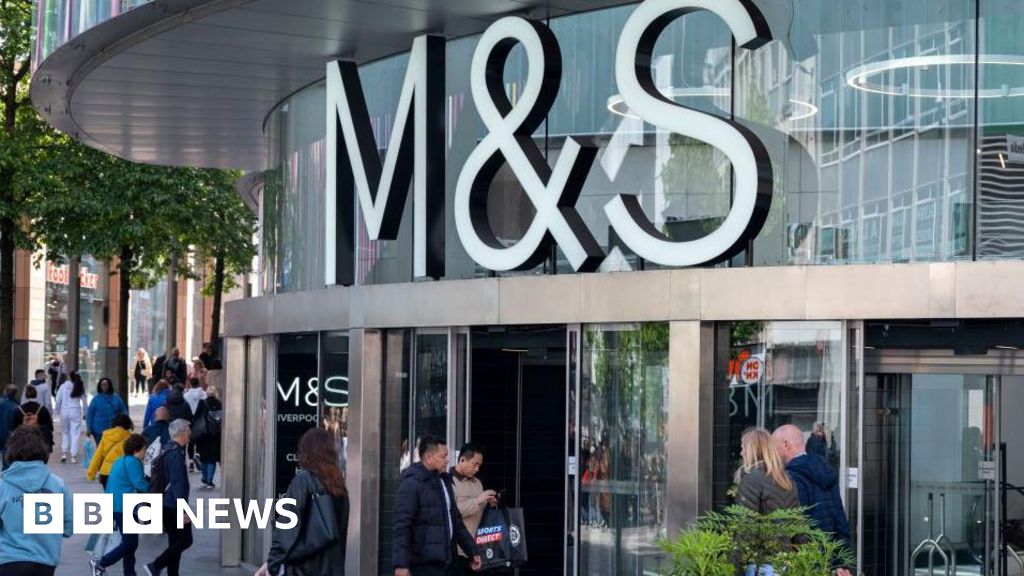
 PA Media
PA Media
Chancellor Rachel Reeves faces "difficult decisions" if she wants to meet her self-imposed financial rules after borrowing costs hit their highest level for 16 years, the former deputy governor of the Bank of England has warned.
Reeves has pledged not to borrow to fund day-to-day spending and to get debt falling as a share of national income by the end of this parliament.
Sir John Gieve told the BBC the chancellor faced a choice between raising borrowing, increasing taxes or cutting back on public spending.
Reeves is currently on her way to China for a three-day visit aimed at boosting trade and economic ties.
Opposition parties had called for her to cancel the trip after the pound fell to its lowest level in over a year and UK borrowing costs rose, but Culture Secretary Lisa Nandy said it was "absolutely right and proper" that the chancellor went and took seriously the UK's relationship with China, the world's second largest economy.
She said the rise in borrowing costs was "a global trend that we've seen affecting economies all over the world".
Why are UK borrowing costs rising and what does it mean for me?US impact
Governments generally spend more than they raise in tax so they borrow money to fill the gap, usually by selling bonds to investors.
UK borrowing costs, which have been rising in recent months, climbed again on Friday, with the cost of borrowing over 10 years at its highest level since 2008.
The pound, which fell to its lowest level in more than a year on Thursday, also dipped at the market open.
Analysts say it is unusual for those two things to happen together but suggest wider concerns about the strength of the UK economy had driven the pound lower.
On Thursday, the Treasury ruled out any emergency intervention in the markets, saying they continued to "function in an orderly way".
Globally, there has been a rise in the cost of government borrowing in recent months sparked by investor concerns that US President-elect Donald Trump's plans to impose new tariffs on imports from Canada, Mexico and China would push up inflation.
UK government bonds - known as "gilts" and which the government uses to raise money - are normally considered very safe, with little risk the money will not be repaid. They are mainly bought by financial institutions, such as pension funds.
Interest rates - known as the yield - on government bonds have been going up since around August.
Sir John said what was happening to long-term yields in the UK reflected what was happening to yields in the US.
"[In] the US, markets are taking a different view of how their economy is going to go once President Trump is in office and their rates have gone up to 4.75% on 10-year Treasuries and ours have gone up in parallel to that. So I don't think this is a response to something we've done," he said.
But he added: "What's happening here in relation to Britain is that the Treasury has come forward and tried to reassure markets by saying we've got new fiscal rules and we're definitely going to stick to those, but it's becoming clearer and clearer that that's going to be very difficult."


Reeves has previously committed to only one fiscal event a year - where she can raise taxes - which would likely be in a Budget in the autumn.
If she needs more money before that, a squeeze on spending is more likely.
On 26 March the government's independent forecaster will put out its latest projections for the economy and will say whether the chancellor is likely to meet her fiscal rules.
A spending review, which sets government department spending, will follow in June.
Sir John said it would require difficult decisions from the chancellor in the spending review and then the Budget.
"The choice she's going to face... is can I raise borrowing - and the increase in interest rates that's happened now, if it continues, will decrease her scope for doing that within her rules - or do I increase taxes again, or do I actually institute some very severe reductions and squeezes on public services."
China trip criticised
Reeves' trip to China comes as the government is looking to revive an annual economic dialogue with the country that has not been held since the pandemic.
Ties have been strained in recent years by growing concerns about the actions of China's Communist leaders, allegations of Chinese hacking and spying, and its jailing of pro-democracy figures in Hong Kong.
The Conservatives and Liberal Democrats have criticised Reeves for proceeding with the planned trip rather than staying in the UK to address the cost of government borrowing and the slide in the value of the pound.
Shadow chancellor Mel Stride accused Reeves of being "missing in action".


Sign up for our Politics Essential newsletter to read top political analysis, gain insight from across the UK and stay up to speed with the big moments. It'll be delivered straight to your inbox every weekday.

 Movie
Movie 3 months ago
77
3 months ago
77 






![Presidents Day Weekend Car Sales [2021 Edition] Presidents Day Weekend Car Sales [2021 Edition]](https://www.findthebestcarprice.com/wp-content/uploads/Presidents-Day-Weekend-car-sales.jpg)



 English (United States)
English (United States)